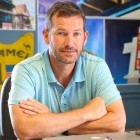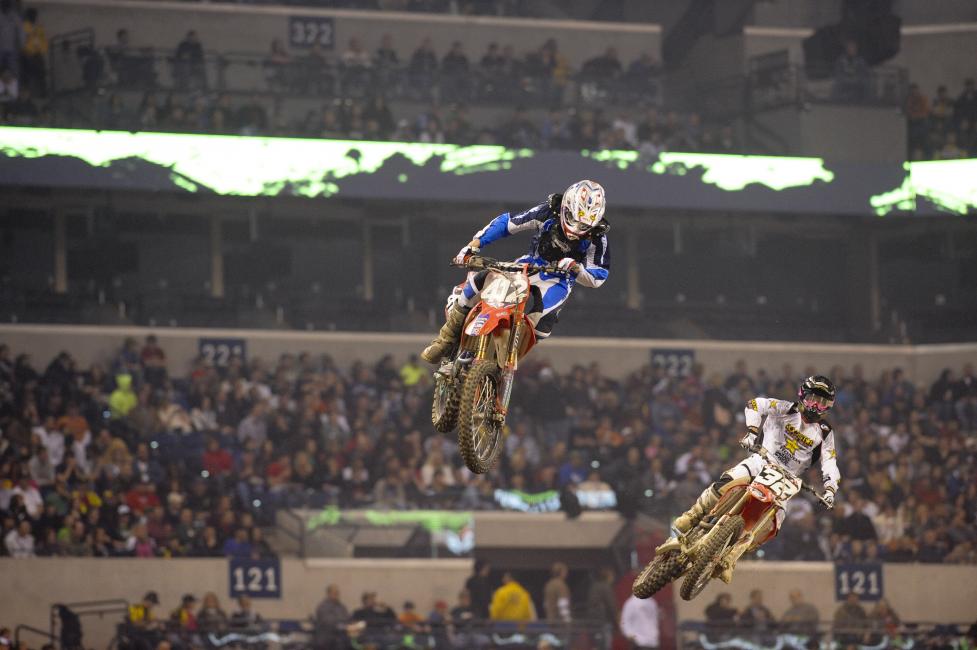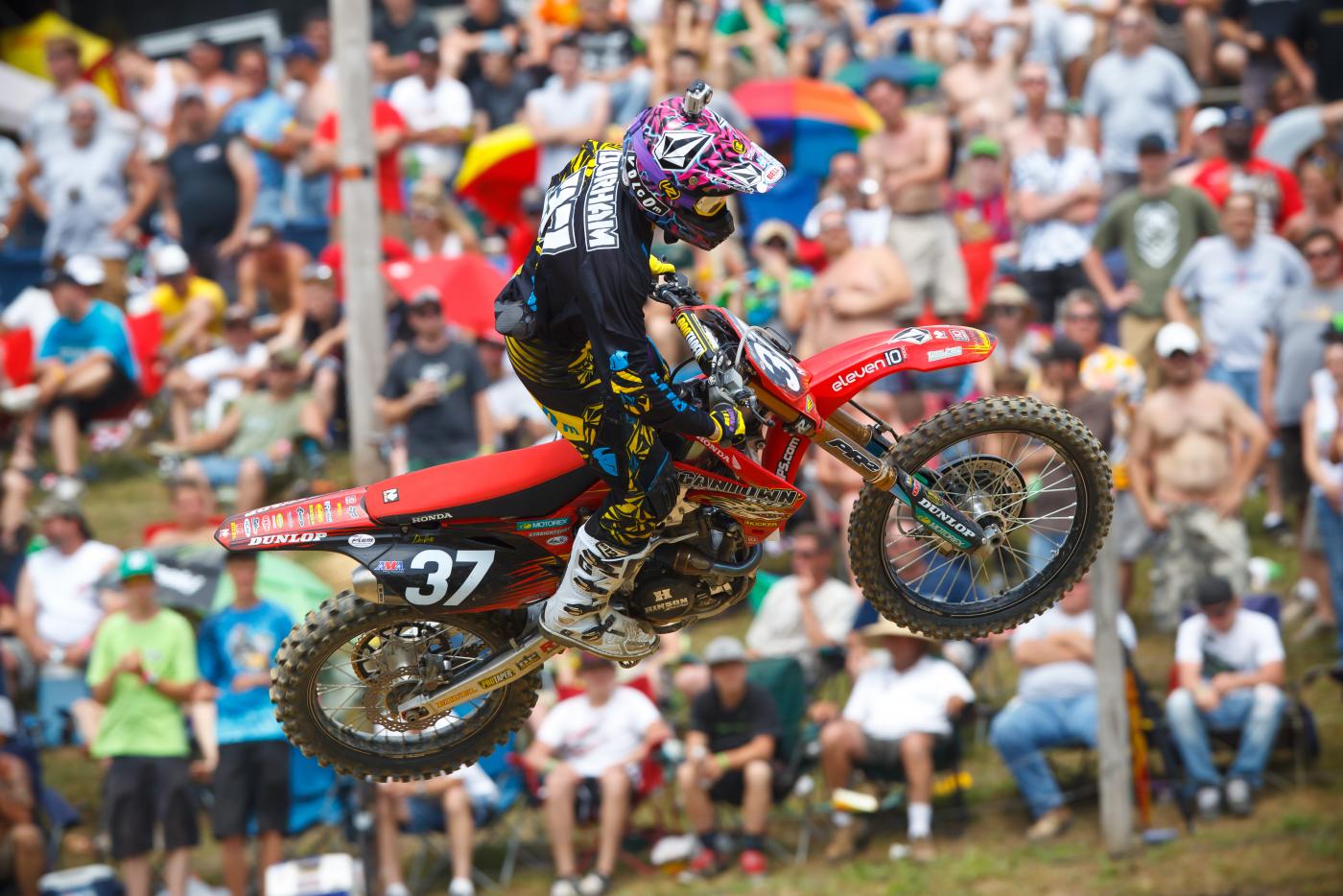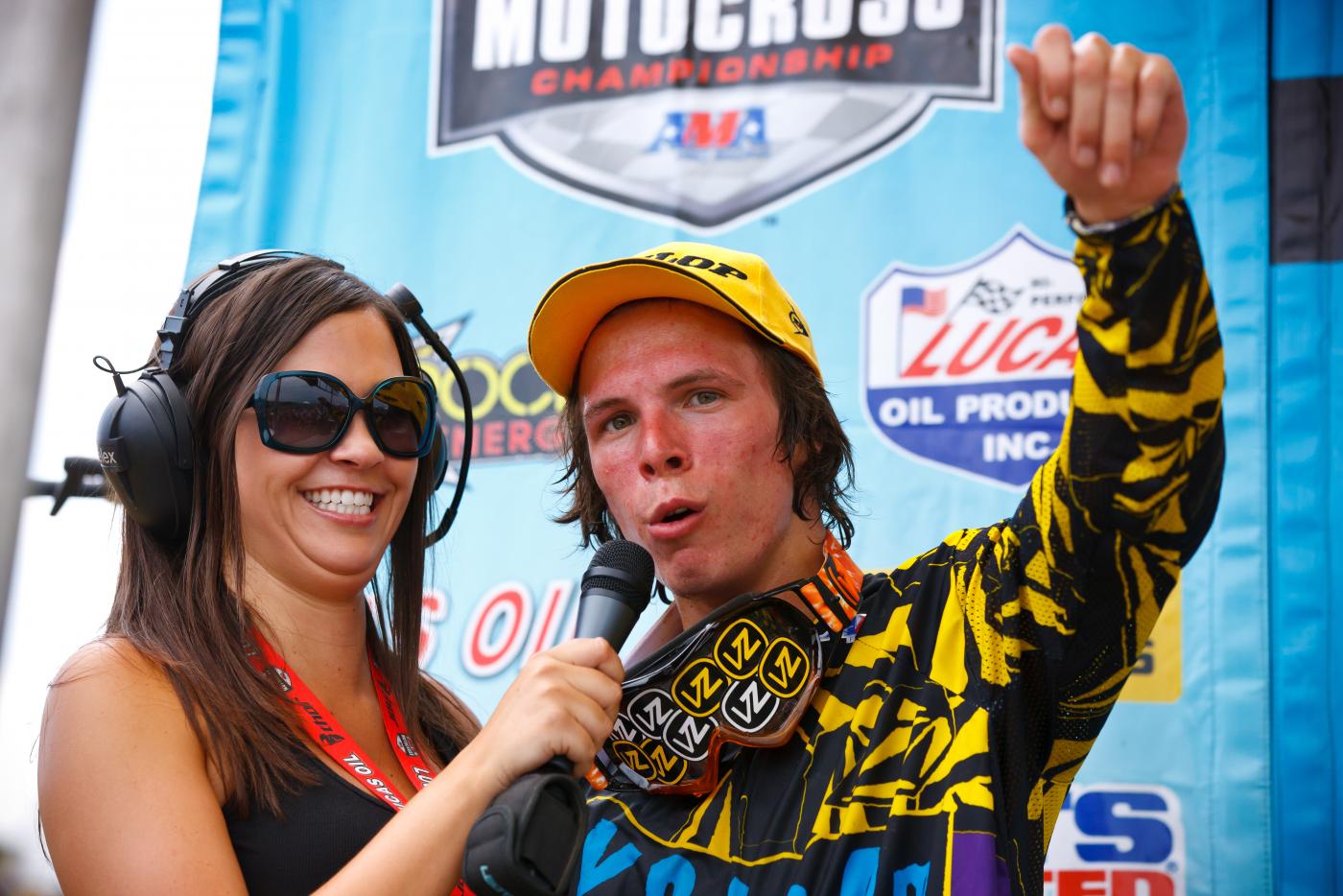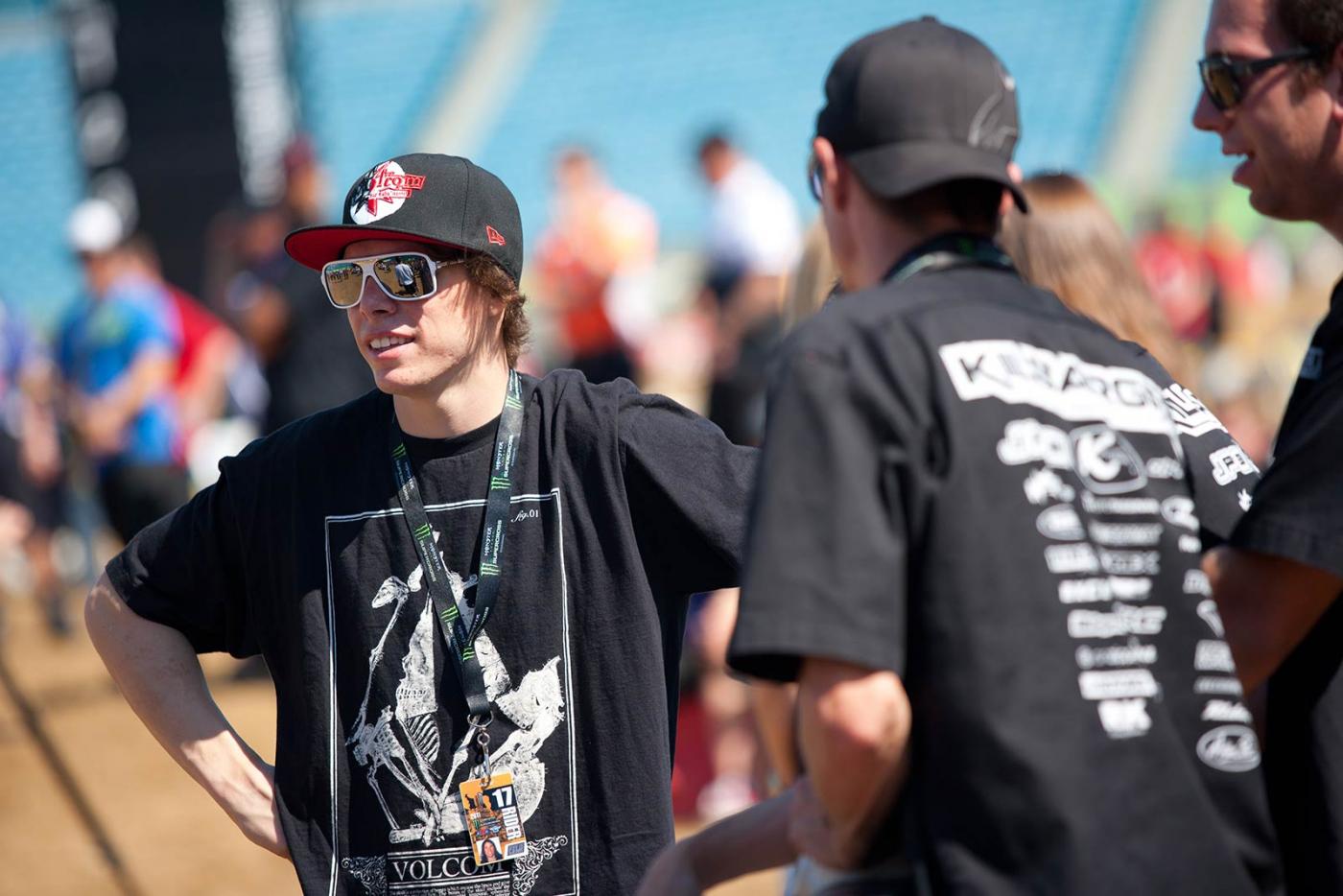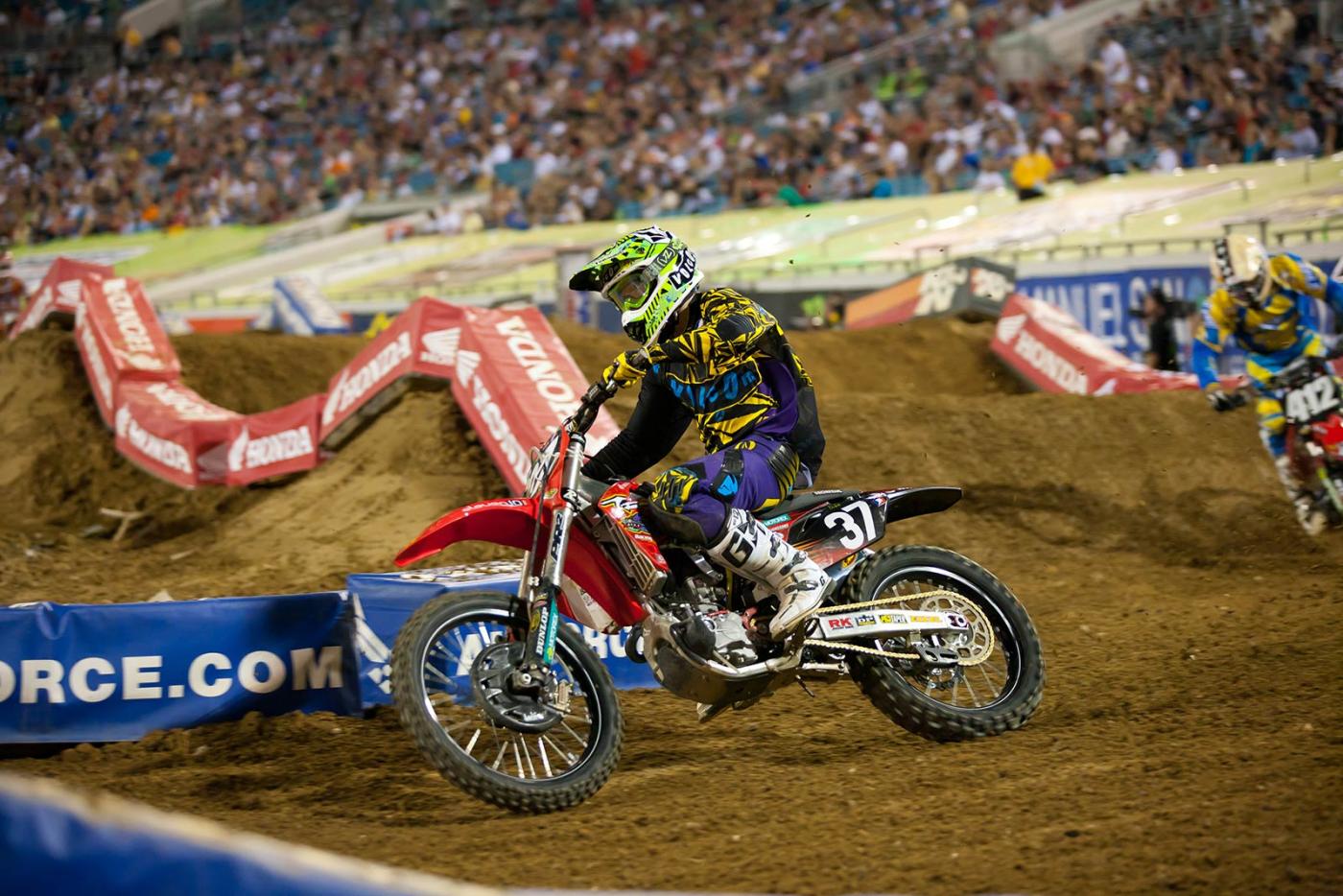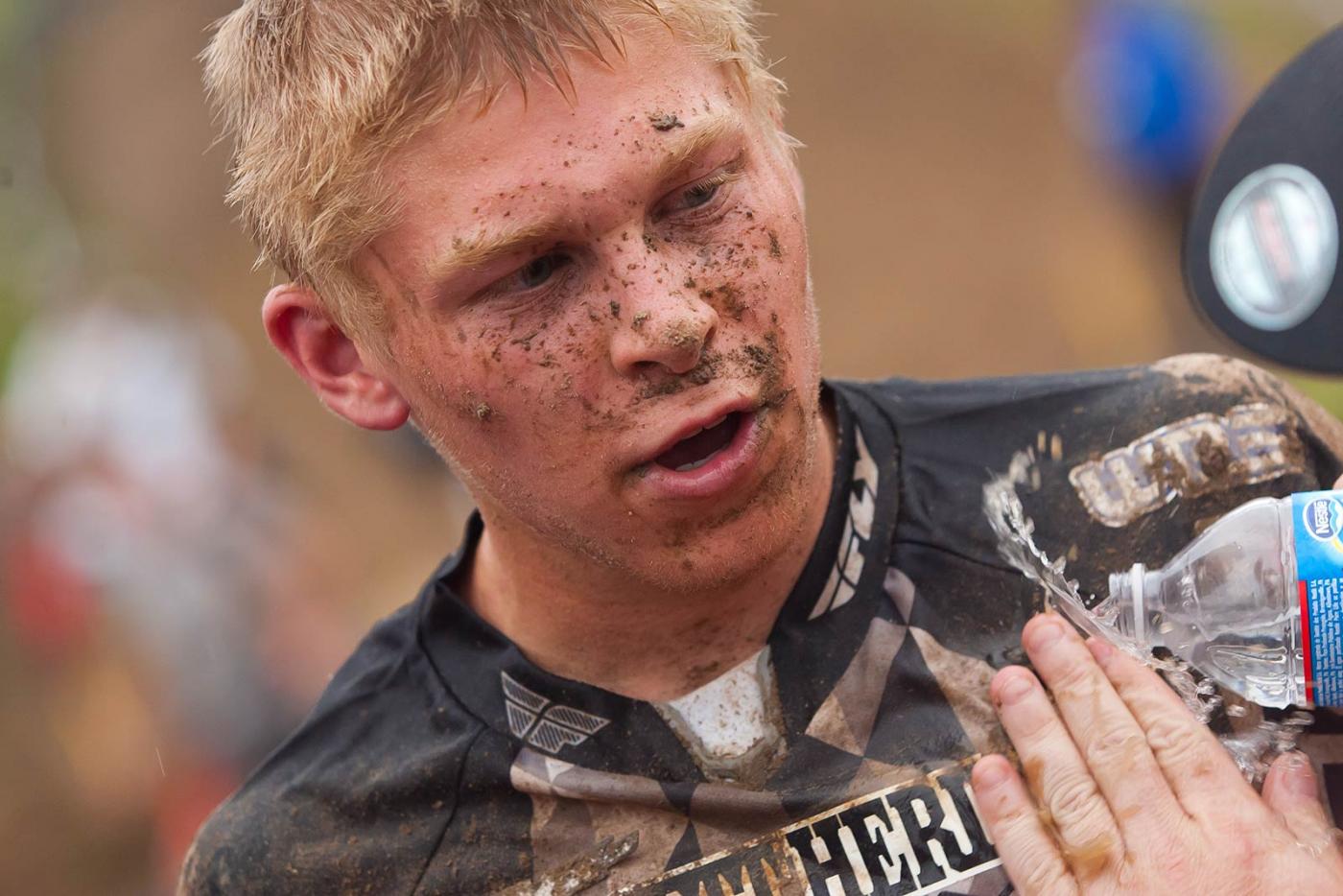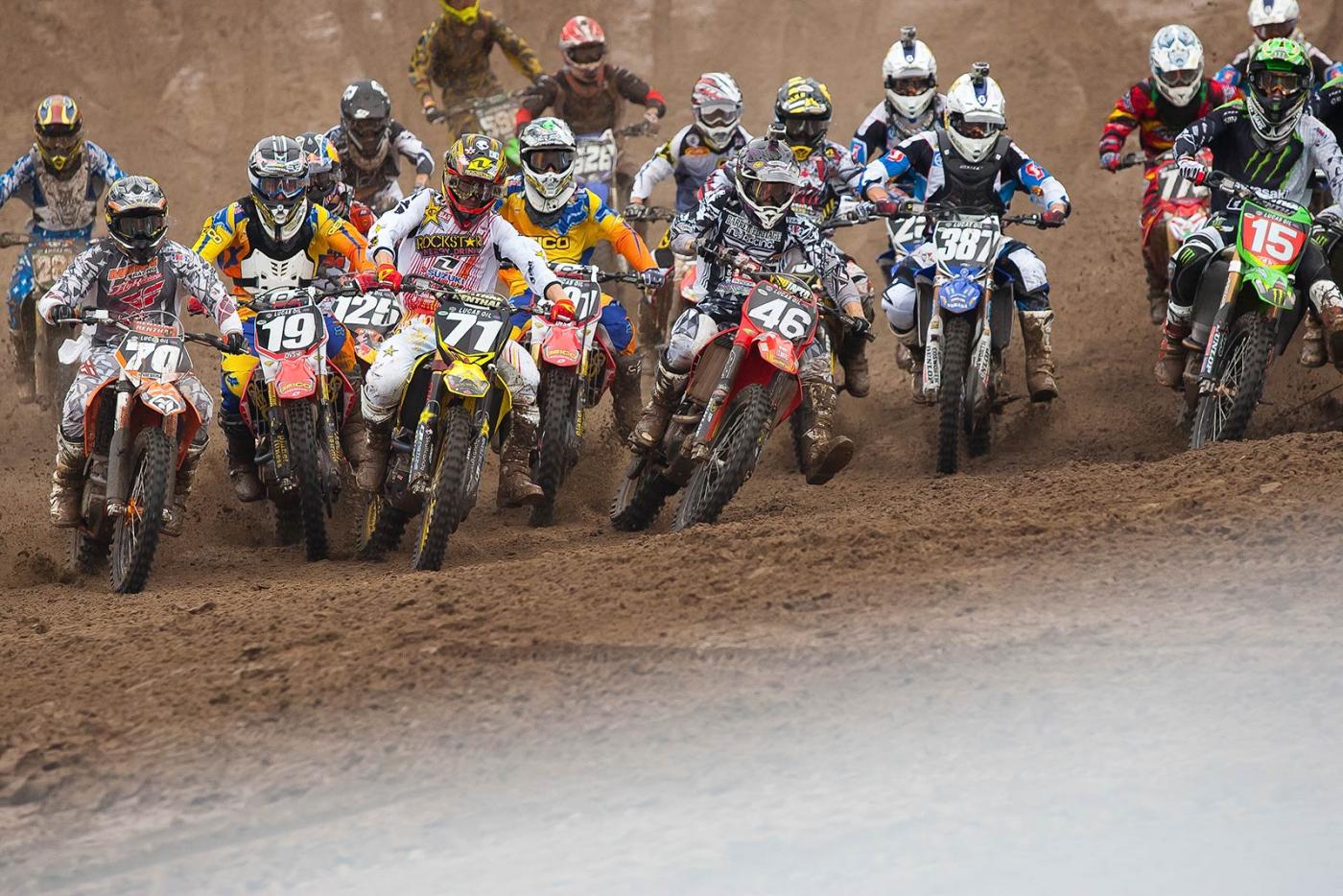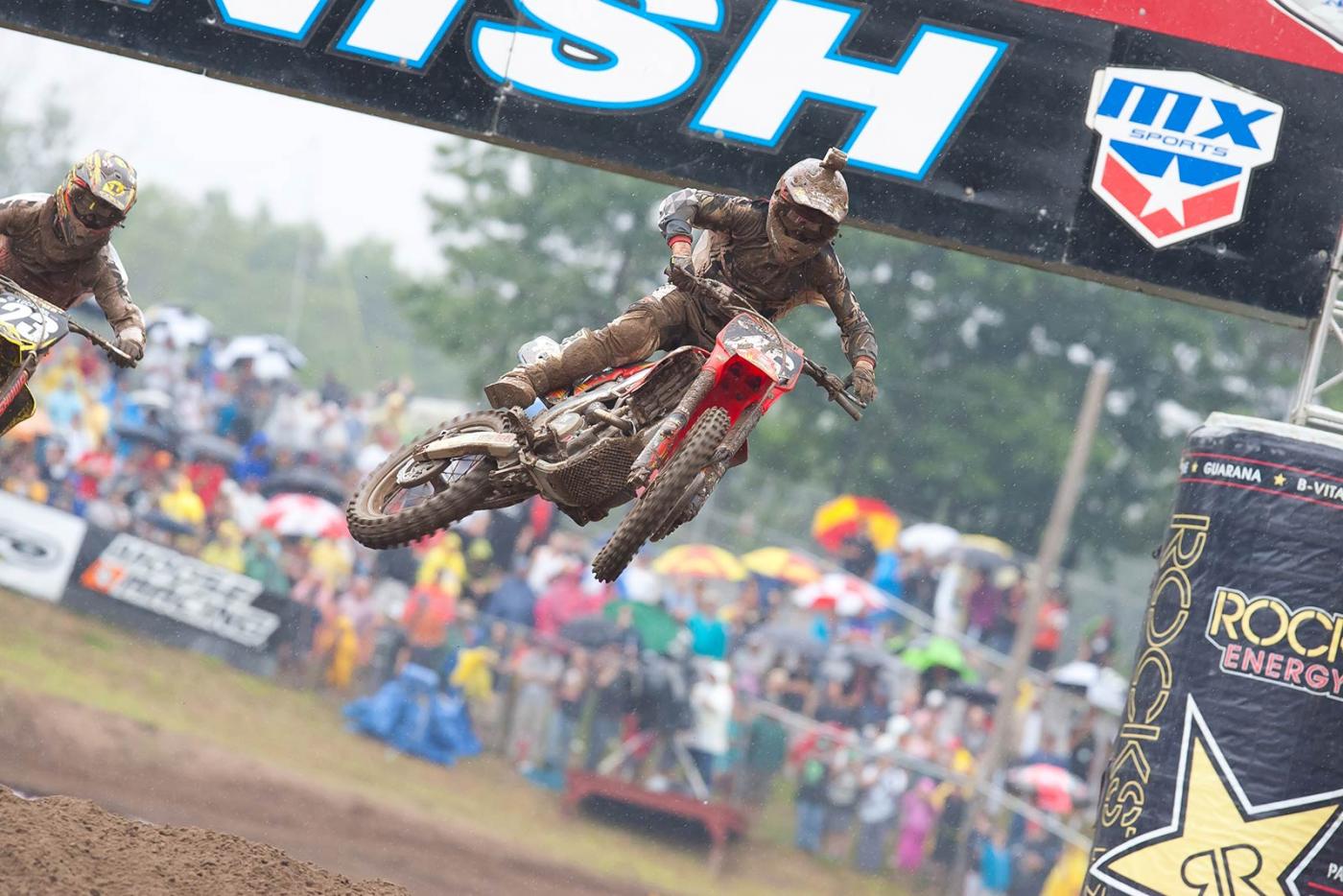Last month we ran Steve Matthes’ epic feature on the Eleven-10 Mods team called “Eleven 10ths,” on Racer X Online.
The story recounted the stories of the Pennsylvania-based privateer team’s years with riders Alex Martin (now of Yamalube/Star Racing Yamaha) and Phil Nicoletti (now with AutoTrader.com/Toytoa/JGR Yamaha). What it was missing were the words of the team’s founder and owner, Chad Sanner. He was the one who built the bikes and paid for the parts and got the team to the races. While it was not always perfect, it helped get each of his three riders—Martin, Nicoletti and Darryn Durham—to bigger and better things. Wanting to know more about his side of the story, where things went right and where they went wrong, we tracked Sanner down in Pennsylvania for a great evening of bench-racing and his own tales of Eleven-10 Mods.
(This is Part 1 of that conversation, to be continued next week.)
Racer X: Chad, earlier this month we posted an oral history, so to speak, of Alex Martin and Phil Nicoletti’s time with the Eleven-10 Mods team. I wish we had been able to track you down before it was posted—it was your team—and get your side of things. I know how hard you worked at making the team a success, how much you sacrificed and how difficult it was to keep it all going through a down economy. So let’s start now at the beginning, when you founded the team: 2009, 2010, 2011—not exactly the best years to be starting a privateer race team. It was right when the recession hit.
Chad Sanner:(Laughs) No, it wasn’t. I really didn’t even want to have a team, but we were doing some work with Levi Kilbarger. I did some work motor work for him in 2009, and right off the bat his dad said he wanted to start a race team. He was just going to go out and buy a semi. But I kind of talked him out of that, explaining to him that there is a lot more to a race team than just having a good bike and a semi. You have to put a lot of stuff together to have a team. So, throughout 2009, when I was working with Levi, I talked to a lot of people about starting a team. I was putting the foundation together with different people I knew. Going into 2010, I told his dad if he wanted to pull the trigger on it, I thought we could do it. He said yeah, so I lined up a bunch of sponsors, got my old boss and former employer at Yamaha of Troy, Scott Paul, and he was all on board and said he would give us the semi to use. That ended up being the Honda of Troy deal with the Kilbargers.
Going into 2011, it kind of fell apart. They wanted to do stuff in Ohio but I didn’t want to do stuff there—I would have had to move and I wouldn’t be getting paid to do the job. So we split, and at that point Darryn Durham was going to ride for that team—he was there because he knew I could build him a good bike.
That’s really how it all started. Darryn was my buddy and I didn’t want to leave him out in the cold. I said, ‘Hey man, we’re going to do this, but I can’t promise you how it’s going to be at the races. We may be in a pickup truck, we may be in a van, but I promise you that I’ll give you the equipment you need to win races.’ That was the only promise he had, and he was like, “Okay, I’m down, let’s do it.” We ended up going to supercross in my Express van—we didn’t even have a box van back then. There were no sponsors—we didn’t have anyone paying us money—it was just like Darryn was my kid and I was taking him racing on weekends on what I was making at my job during the week.
What was it like competing against the giants like Pro Circuit, GEICO/Factory Connection, Star Racing, TLD…
Right off the bat we were behind. Darryn was working hard during the off-season and when we showed up at that first supercross, I think he was ready to win races for sure, but then he broke his foot in that first qualifier that he was winning.
Where you having any luck bringing sponsors on?
We were working on a few things with another buddy of mine, Mark Tyson at Renegade Fuels, and he thought maybe we could put something together, but that fell through. Mark really liked what we did the year before and he was just trying to help. Aside from that, no, we really didn’t have any sponsors lined up for 2011. It was way too last minute for Darryn to get any kind of deal. But he was so happy with the equipment, he was okay with it—he thought our bike was better than all of those other teams’ bikes, and would argue with him that they weren’t. I would point at one of the team bikes and say, ‘Dude, do you really believe that even with their budget, our bikes are better than that?’ And he would look me right in the eye and say, “Yes, definitely.” It was almost like an argument, joking.
Was that the year he and Nico Izzi led High Point and did that GoPro lap in front of everyone in the first moto?
Yes, that was that year. The year before that, when we did the Honda of Troy deal, he was telling me the same then—that our bikes were somehow the better bikes. That’s why he was really comfortable going into 2011 with what we had. We were going to make it happen, one way or another, and he knew that too. It was his best option. Riders know that it takes equipment more than anything to compete.
What happened next?
That was the year Alex [Martin] was calling me and calling me, begging me to do something with him, and I would tell him, ‘Sorry, I can’t. I have no sponsors, I am just doing it just to try to put Darryn somewhere.’ His plans in 2011 were either a) Get him on a bike that will help him move up to a better team, or b) Get him on a bike that might actually attract some sponsors for us to maybe do it again the next season. I was just helping out a buddy who would not have had the equipment to get up front, so he would have basically been done. I mean, all of these kids are really fast now, and if you don’t have the equipment to compete, it’s not going to happen. You see kids all the time who are better, but they don’t the bike to get up there. I just didn’t want to see Darryn’s career go away—that’s how it all started.
And he ended up with a gig with Monster Energy/Pro Circuit Kawasaki—not a bad move, from a box van to Pro Circuit’s semi.
Yes, and after the last race that season at Pala, I was driving back home—me and his mechanic had driven his bike out to that race—and Darryn called me. It was still daylight, but we were already on the road because we had to drive straight back across the country to get to work, so Darryn and I didn’t get to talk, but I kind of already knew what was going on. He called and was super bummed out and he was afraid I was going to be mad at him and what not, and I know how hard those conversations can be, and I was like, ‘Man, this is what you wanted. I mean, I respect you so much for even picking up the phone and calling me to tell me exactly what was going on.’ He was like, “I’m really sorry but this (Pro Circuit) is what I have going on next year.” And I’m like, Darryn, what are you sorry for? My feeling was, like, mission accomplished. We took you from just trying to get sponsors—and not even money sponsors but just product sponsors—to you getting a Pro Circuit deal! I was really happy for him. All of the blood, sweat and tears were worth it. We had no money, and everyone involved in the program was doing it because they wanted to do it. We all had the same goal, so for that to happen, I was just so happy for him.
You mentioned how difficult it is to compete now, especially in the 250 class, and you have to pay for that equipment somehow, so you were working on amateurs’ bikes and other guys stuff at the same time to fund the pro guys on your team?
Yes, completely. The work that we were doing during the week was 100 percent funding these guys going racing every weekend. That was the only money that there was—what I made doing engines and bikes during the week.
Did you get a share of the prize money? Was it split with you as an independent team owner?
No, the riders kept it all, which is kind of tough sometimes, because there was like GoPro money for the guys, and usually a team keeps stuff like that, and had those guys used some of their personal sponsor money to put towards our program, things would have been a whole lot less stressful. It would have probably gone a lot smoother. That’s a situation that when I look back on, yeah, they were all getting paid for their riding gear from different companies, not like a team deal, so right off the bat, yes, that would have made a difference.
That’s the racecar team model, or even Pro Circuit or TLD or Star Racing—when you sign up with them, you are running whatever the team is running. It’s pretty much a head-to-toe deal, like if you were on Pro Circuit you were going to wear Vans, your remote control car was a Traxxas, your gear was Thor…
Right, exactly. And Darryn knew and appreciated that. He knew he was getting paid in other ways so he was a little more laid back about things, he knew that scenario. Darryn was one guy that appreciated the platform we were giving him. The thing that really hurt me—not because of him but for him—was that he was getting all of these offers, but then he got hurt at that first round, then broke another bone the day he was going to get an X-ray to be cleared. He would have only missed one race had he not had that second broken bone. He was living with Alex in the motorhome, he was on crutches and Alex’s stuff was in the way, and he tripped over Alex’s shoes! It was right before Daytona. He called me and said, “I think I hurt my foot again, but not in the same place.” Turned out it was another two bones—a way worse injury—just tripping out of the motorhome. That caused him to miss two more races, and even when he came back, he still wasn’t 100 percent but he was still doing great and going fast. Teams were wanting to take him on for outdoors, even though he missed half of supercross being hurt. But they all already had sponsors, and if he were to go to this team of that team, he would have had to break off all of his old sponsors, and the bike would have still been equal to what we had for him, so he didn’t go.
Throughout the whole summer he was checking out other people’s bikes, and he was totally upfront about it, calling me and giving me feedback on how they were different and all, and I think he was getting himself all bummed out because he knew he was going to have to make a move, so it wouldn’t be such chaos throughout the week and he would know his schedule, he would be all set. I guess it all came down to if we had just had sponsors, and the day to day security of knowing where we were going to be, I don’t think there’s any way he would have left—he would have loved it. It was just the stress and chaos that wasn’t working.
In the beginning we were going to go to Anaheim with Darryn but then he wasn’t ready. At that point anyone in their right mind would have called Alex and said, “Hey, sorry about your luck but we’re going to pull the plug..."
So next came Alex and Phil [Nicoletti], who weren’t nearly as close to getting a deal going as Darryn was in 2012, right?
Yes, first it was Alex, who was calling me, calling me, trying to get something going. I told him I was just doing it to basically help my friend out. I don’t have any sponsors, so there are no spots available. It wasn’t that I didn’t think he would do well—I watched him all throughout 2010 and I was impressed and paid a lot of attention to him. He was around Darryn a lot, especially outdoors, and I took notice of the bike he was riding, how well he rode and how he worked and I could kind of compare them. I thought, ‘Man, if this kid just got some good equipment he would really do well.’ Now I’m not saying the equipment he had was bad, but I just knew we had a better bike.
Finally, I said, Okay, here’s what we can do. He had kind of done the Wonder Warthog deal where they brought your bike to the races, so I said if you want to do a deal like that, I will take your bike to the races but you have to do everything else. You have to pay for all of your parts, you have to pay for everything. I’ll build you the same bike as Darryn, we’ll take it to the races, but you have to have your own mechanic. I will do the original build but you have to do the rest. Any parts or product sponsors that I have I will pass on to you and you can have your own product sponsors and whatnot, just run our graphics and look like you’re a part of a team. He said, “Yeah, let’s do it.”
In the beginning we were going to go to Anaheim with Darryn but then he wasn’t ready. At that point anyone in their right mind would have called Alex and said, “Hey, sorry about your luck but we’re going to pull the plug,” but I knew that he had been working really hard, he had dropped his 450 off here and it was ready, and I just couldn’t bring myself to cut it off like that.
So that whole trip, after putting all of the costs in parts into his bike, I can remember it being around three grand to get him to that first round. So we drove straight out on Wednesday morning, got there sometime Friday night, did the race on Saturday night, went to my buddy’s house and stayed the night, and then drove straight back on Monday.
It was an eye-opener for him, and we probably should have not even gone, but I just didn’t want to let this kid down. He needed that extra track time—if I could just get his bike out there, and then other people could haul it for however many races he did—so we did it. When I saw him first thing Saturday morning, it was like, “Here’s your bike!” That was it—I don’t think we even took a toolbox. It was on them at that point, I knew he had a good mechanic who put his whole program together the year before, and I figured that guy would be able to handle it. Alex was like, “Didn’t you bring any extra parts?” And I said, ‘Dude, it’s a 450, I don’t have an extra parts! All we have is what we bought to refurbish it and bring it out here for this race for you.’ Turns out they didn’t have anything either, just what his mechanic brought in his backpack for tools. This was already more money than I had anticipated spending.
Anyway, he ended up doing okay, he learned a lot and was able to get a couple extra rounds of supercross in, even if it was on a 450. But I really didn’t think I would have to worry about anything with Alex because he had such a strong program of his own and his mechanic knew what he was doing. I think he even does his own suspension, so I was just trying to add what I was doing to what he was already doing. I just wanted to get him a better motor to go with what he already had.
Right after California, I don’t know if his old mechanic got a new job or had a new family member or what, but it was all of the sudden—boom!—the bomb dropped and the whole thing gets dropped on me. It was like, “Hey, you have Alex now, and you have to take care of him completely.” That was stress that I wasn’t planning on having. That was probably the thing that put the chokehold on the program for the rest of the year. All of the problems we have, that was probably the biggest contributing factor to all of them. Had I known that that guy wasn’t going to be there, I probably would not have taken Alex on. We had to get him a mechanic—though he was paying for it—but we had to find one that worked for him. It really put a damper on things. Most people would have pulled the plug, but I couldn’t do that to him. He was already staying with me, he would get up at six in the morning and I would be getting up and crossing paths with him on the way to the shop. I would ask him what he was doing and he would say, “Oh, I think I’m going to warm up by going out and running ten miles.” And he would really do that—get up and go run ten miles every day!
Neither one of the Martin brothers are allergic to hard work.
Not at all. I can tell you that Alex logged a lot of miles. If you could put a tracker on him, you would see he put a lot of miles on his dirt bike, a lot of miles on his bicycle, a lot of miles on a pair of shoes!
Looking back at the whole situation, I don’t think Alex could ever understand that there really wasn’t any money—it was just what I had in my bank account. Mondays we would have $75 left in the account, so we would have to work all week—we had to make the money to get the parts we needed to fix or replace things from over the weekend, and we didn’t have the money for that until we made it. But even though the situation was real tough that year, I think Alex eventually got comfortable with it. At the beginning he was super stressed, but then it started to change. I still don’t think he ever understood how much effort went into just getting him out there—especially after his mechanic, who had it all dialed, up and left. I’m sure he appreciated it and understood, but not the full extent of what we were going through. And as the year went on, and I saw how he worked and what he did, I really start to like working with him.
But I still should have quit before 2012, because 2011 was about Darryn—no one thought that Alex was going to be getting on the podium.
So that’s why you kept him for 2012 after Darryn moved on?
Yes, I saw how he rode and how hard he worked, I felt in my mind that it was possible for Alex to make it. I put some real effort into trying to help him and talk to him, because I think a lot of it was mental for him. Being a former racer myself, I would always try to help pad his psychological side by telling him to just not worry about every little thing, like if you get a good start, don’t worry if a guy or two passes you. You’re going to stay up there. I kept beating that into his brain and all of the sudden he started getting killer starts and he would stay up there. And that’s exactly what he did in 2011 at Southwick. That was probably the best feeling ever—to put Alex on the podium at that race. I knew what he was capable of, so it’s no surprise to me how well he’s doing now, because I would tell him back then that that’s where he belonged.
(TO BE CONTINUED)


